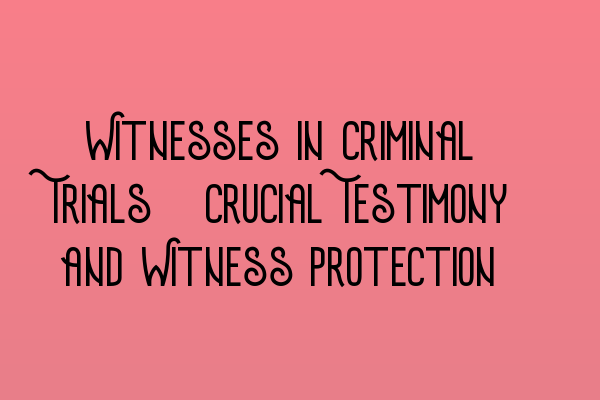Witnesses in Criminal Trials: Crucial Testimony and Witness Protection
When it comes to criminal trials, witnesses play a crucial role in presenting evidence and helping the jury determine the guilt or innocence of the accused. The testimony of witnesses can make or break a case, and their importance cannot be understated. In this article, we will explore the significance of witnesses in criminal trials and the measures taken to protect their safety.
Importance of Witnesses
Witnesses provide firsthand accounts of events related to a crime. Their testimony can include what they saw, heard, or experienced, and this information can be vital in establishing the facts of a case. Whether it’s an eyewitness who saw the crime being committed or an expert witness who provides specialized knowledge, witness testimony helps the court to understand the sequence of events and form a more accurate picture of what occurred.
Moreover, witnesses can provide corroborative evidence that strengthens the prosecution’s case. The credibility of witnesses, their reliability, and their ability to provide information in a clear and compelling manner are all factors that can influence the outcome of a trial.
Throughout the course of a trial, witnesses may be examined and cross-examined by both the prosecution and the defense. Their accounts may be scrutinized, and it is the responsibility of the jury to evaluate the credibility of each witness. Factors such as consistency, demeanor, and the presence of any biases may all be taken into consideration during this evaluation process.
Witness Protection
Witnesses in criminal trials are often exposed to potential risks, especially if their testimony implicates dangerous individuals or criminal organizations. To ensure their safety and encourage them to come forward, witness protection programs have been established.
Witness protection programs provide various measures to safeguard witnesses and their families. These can include relocation, the issuance of new identities, and physical protection. The specific details of a witness protection program vary from jurisdiction to jurisdiction, but the objective remains the same – to provide witnesses with a secure environment where they can testify without fear of repercussions.
The concept of witness protection extends beyond the physical safety of witnesses. Emotional support and counseling may also be provided to help witnesses cope with the stress and trauma associated with their involvement in criminal trials. These support services are essential in ensuring that witnesses are able to provide accurate and reliable testimony.
Conclusion
Witnesses are integral to the criminal justice system, and their testimony plays a vital role in determining the outcome of trials. The significance of witnesses cannot be emphasized enough, as they provide firsthand accounts and critical evidence that help establish the facts of a case. To protect witnesses from potential harm, witness protection programs have been established to ensure their safety and well-being.
If you are preparing for your SQE 1 exam or looking for SQE 2 preparation courses, check out our related articles:
